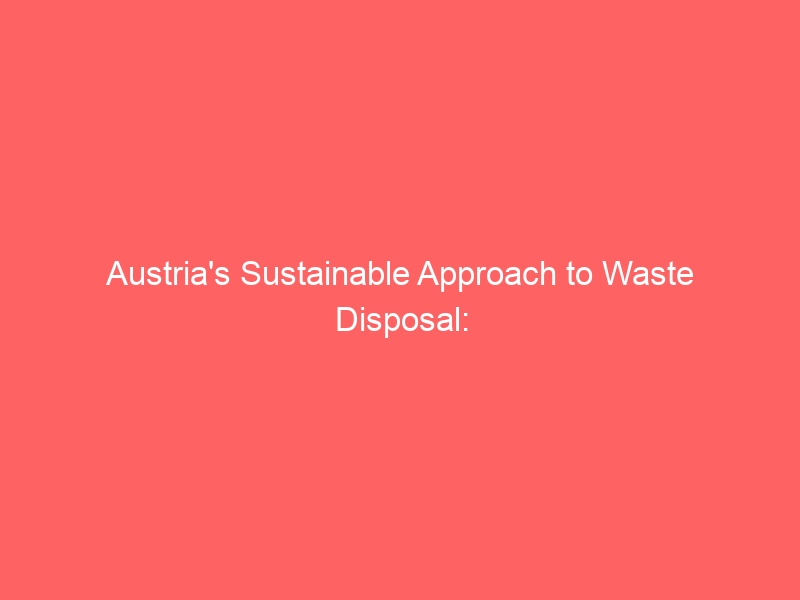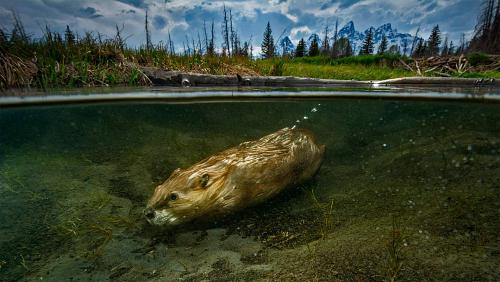Austria is well-known for its breathtaking landscapes and commitment to environmental sustainability. The country has taken a proactive approach to waste disposal in recent years, implementing innovative strategies to reduce the impact of waste on the environment. One key component of Austria’s sustainable waste management system is the use of incinerators. These facilities play a critical role in the country’s efforts to achieve a greener future by responsibly managing waste and minimizing its environmental impact.
Austria’s approach to waste disposal is guided by the principles of the circular economy, which aims to minimize waste generation, promote recycling and reuse, and ensure the responsible management of waste that cannot be avoided. By incorporating incineration into its waste management strategy, Austria is able to effectively manage residual waste while also generating energy and reducing its reliance on fossil fuels. This sustainable approach to waste disposal has positioned Austria as a leader in environmental stewardship and has garnered international recognition for its innovative solutions.
The Role of Incinerators in Austria’s Green Future
Incinerators play a key role in Austria’s waste management system, particularly in the responsible disposal of residual waste that cannot be recycled or reused. These facilities use advanced technology to combust waste at high temperatures, reducing its volume and converting it into energy. This process not only minimizes the amount of waste that ends up in landfills but also generates electricity and heat that can be used to power homes, businesses, and public facilities.
Austria has seen significant success in integrating incinerators into its waste management infrastructure. These facilities are equipped with state-of-the-art emissions control technology, ensuring that the combustion process is conducted in an environmentally responsible manner. As a result, incineration has become an integral part of Austria’s efforts to reduce its carbon footprint and transition to a more sustainable energy landscape.
Furthermore, the energy generated through incineration contributes to Austria’s renewable energy goals, as the country strives to reduce its dependence on non-renewable resources and mitigate the environmental impact of its energy consumption. By harnessing the potential of incinerators to produce clean, renewable energy, Austria is paving the way for a greener and more sustainable future.
Austria’s commitment to sustainable waste management extends beyond the technical aspects of incineration. The country has also prioritized waste prevention, recycling, and resource recovery, recognizing the importance of minimizing the environmental impact of waste at every stage of its lifecycle. By incorporating incineration into a comprehensive waste management strategy, Austria is able to effectively manage residual waste while also generating energy and reducing its reliance on fossil fuels.
Frequently Asked Questions about Incinerators and Waste Management in Austria
Q: Are incinerators environmentally friendly?
A: Modern incinerators are equipped with advanced emissions control technology, ensuring that the combustion process is conducted in an environmentally responsible manner. As a result, incineration can be a sustainable and environmentally friendly means of waste disposal, particularly for non-recyclable and non-reusable waste.
Q: How does incineration contribute to Austria’s renewable energy goals?
A: Incineration generates electricity and heat, which can be used to power homes, businesses, and public facilities. By utilizing this energy, Austria is able to reduce its reliance on non-renewable resources and contribute to its renewable energy goals.
Q: What measures are in place to ensure the safe and responsible operation of incinerators in Austria?
A: Austria has stringent regulations and standards in place to ensure the safe and responsible operation of incinerators. These facilities are subject to rigorous environmental and safety requirements, and are monitored closely to ensure compliance with relevant regulations.
Q: How does Austria manage its non-recyclable and non-reusable waste?
A: Austria’s waste management system incorporates incineration as a means of managing non-recyclable and non-reusable waste. By using incineration to convert this waste into energy, Austria is able to minimize the impact of residual waste on the environment while also generating renewable energy.
Q: What role do incinerators play in Austria’s circular economy?
A: Incinerators are a key component of Austria’s circular economy, as they allow for the responsible management of residual waste that cannot be avoided, reused, or recycled. By converting this waste into energy, incinerators contribute to the circular flow of materials and resources, minimizing the environmental impact of waste disposal.
In conclusion, Austria’s sustainable approach to waste disposal incorporates incinerators as a key component of its waste management strategy. These facilities play a critical role in responsibly managing residual waste, minimizing its environmental impact, and generating renewable energy. Through its commitment to innovative and environmentally responsible waste management practices, Austria is paving the way for a greener future and setting an example for sustainable waste management on a global scale.








